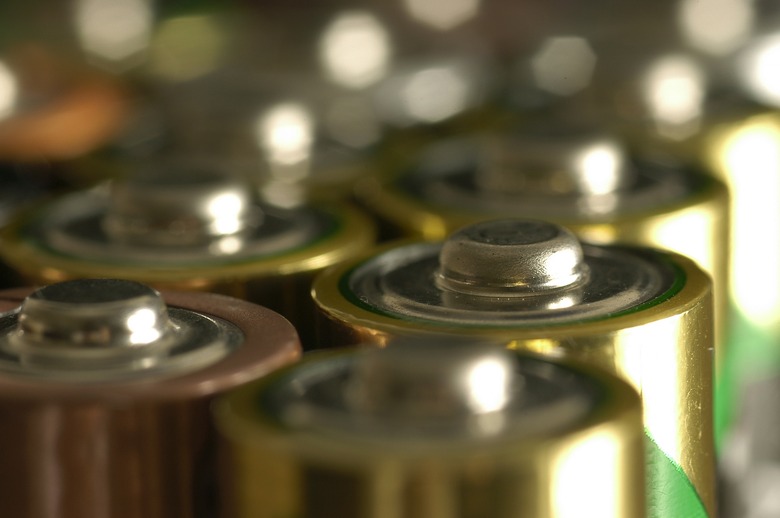What Do Batteries Do To The Environment If Not Properly Recycled?
In many ways, we live in a battery-driven society. From our cell phones, laptops and other electronic devices to children's toys and cars, modern life runs on batteries. But they're not just used in consumer goods. When storms knock out the power grid, batteries keep hospital equipment working and trains running. If you have a landline, you can still make and receive calls because batteries power the phone lines. But batteries can seriously damage the environment—and human health—if not disposed of properly.
How Batteries Work
How Batteries Work
Before the battery was invented, power generation required a direct connection with a source of electricity. That's because electricity cannot be stored. Batteries work by converting chemical energy into electrical energy. The opposite ends of a battery—the anode and the cathode—create an electrical circuit with the help of chemicals called electrolytes that send electrical energy to a device such as a cell phone when the device is plugged into the battery.
Batteries and the Environment
Batteries and the Environment
The exact combination and number of chemicals inside a battery vary with the type of battery, but the list includes cadmium, lead, mercury, nickel, lithium and electrolytes. When thrown in the household trash, batteries end up in landfills. As the battery casing corrodes, chemicals leach into the soil and make their way into our water supply. Eventually they reach the ocean. Also, lithium in batteries reacts in a volatile way when exposed. According to Battery University, lithium can cause landfill fires that can burn underground for years. This releases toxic chemicals into the air, which increases the potential for human exposure.
Batteries and Human Health
Batteries and Human Health
According to the Agency for Toxic Substances & Disease Registry, cadmium and nickel are known human carcinogens. Lead has been linked to birth defects and to neurological and developmental damage. Mercury is also highly toxic, especially in vapor form, which is why the government banned its use in batteries in 1996. Negligible amounts of mercury traceable to other materials used in the manufacture of batteries may still occur, but they don't present a threat to human health.
How To Recycle Batteries
How To Recycle Batteries
Rechargeable batteries contain dangerous heavy metals and should always be recycled. New cell phones are usually packaged with mailers so that consumers can return their old phones for recycling. National recycling programs like Call2Recycle (listed in the Resource section), accept used rechargeable batteries as a public service. Lead-acid batteries, the kind used in cars, can be recycled through local or state hazardous waste programs. Most automotive supply stores will accept old car batteries to send to the proper recycling authorities. Single-use alkaline batteries used to contain large amounts of mercury, but since the 1996 federal law banning mercury in batteries, they are now considered safe to throw in the trash. It's still a good idea to recycle alkaline batteries, but since they are not considered hazardous waste it can be challenging to find recycling programs that accept them. Sometimes your local municipal recycling service will take them. Another option is to recycle them in bulk. Big Green Box (listed in the Resource section) allows you to do that.
References
- Environmental Protection Agency: Wastes – Resource Conservation – Common Wastes & Materials
- MIT School of Engineering: How Does a Battery Work?
- Battery University: How To Recycle Batteries
- Agency for Toxic Substances & Disease Registry: Cadmium
- Agency for Toxic Substances & Disease Registry: Mercury
- Agency for Toxic Substances & Disease Registry: Lead
- Environmental Protection Agency: Laws and Regulations
- Environmental Protection Agency: Implementation of the Mercury-Containing and Rechargeable Battery Management Act
- Agency for Toxic Substances & Disease Registry: Nickel
- University of Wisconsin: Office of Risk Management
Cite This Article
MLA
Kattenburg, Kathy. "What Do Batteries Do To The Environment If Not Properly Recycled?" sciencing.com, https://www.sciencing.com/what-do-batteries-do-to-the-environment-if-not-properly-recycled-12730824/. 12 November 2013.
APA
Kattenburg, Kathy. (2013, November 12). What Do Batteries Do To The Environment If Not Properly Recycled?. sciencing.com. Retrieved from https://www.sciencing.com/what-do-batteries-do-to-the-environment-if-not-properly-recycled-12730824/
Chicago
Kattenburg, Kathy. What Do Batteries Do To The Environment If Not Properly Recycled? last modified August 30, 2022. https://www.sciencing.com/what-do-batteries-do-to-the-environment-if-not-properly-recycled-12730824/
